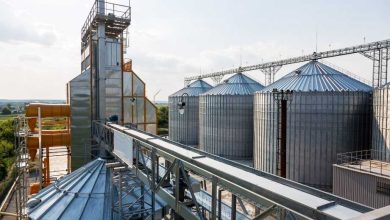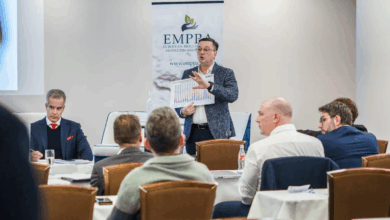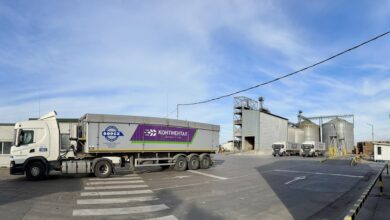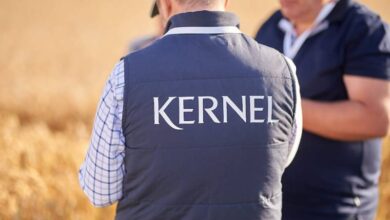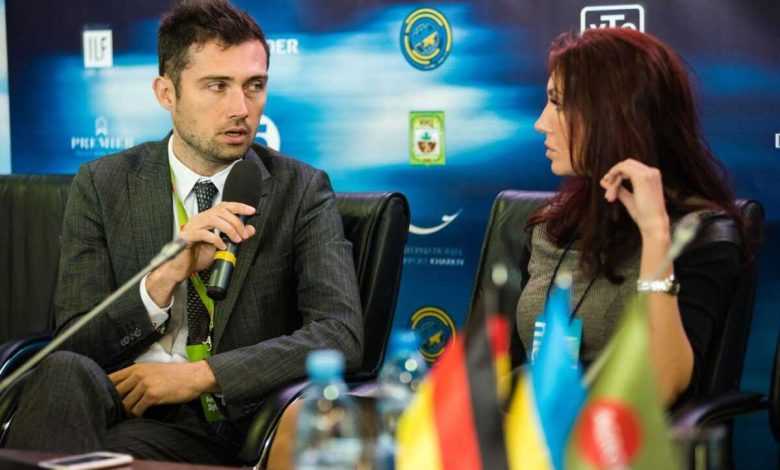
Our interview with Andrey Dubetskiy, the Executive Director of the Representative Office of the Warsaw Stock Exchange in Ukraine, took place neither in the office nor in the café. We talked on the stage erected in the terminal of Kharkiv international airport by organizers of Agroport Forum 2015, in front of the full house of listeners. Agroport is the initiative of Alexander Yaroslavskiy, the founder of DCH business group. The three-day forum is held for the second time. The results of the first Agroport which took place a year ago in the same period – mid-October, inspired А. Yaroslavskiy. Now this event will be held on the annual basis. Its mission is to attract foreign investors to the Ukrainian agribusiness. One of the aspects of this topic we discussed with Dubetskiy in the presence of the Forum visitors, who came to listen to the reports of the thematic panel discussions. We talked about preferences of investors who work through the Warsaw Stock Exchange, if their interest to Ukrainian agricultural companies have cooled down for a long time, and what holding companies managed to win back their fall. This is just a small list of issues we were discussing. For those who were unable to participate in the forum and listen to our conversation on the stage, we are pleased to present it on paper.
Ukrainian public companies are getting cheaper. For example, especially noticeable fall was registered with the quotation of Milkiland Company. It is a quick glance at the diagrams. Can you confirm the general trend?
In fact, there was a tendency to fall in the market. However, the trend has changed in the end of last year. Companies that managed to adapt to new realities and to shift to other markets won back their position. For example, in the middle of this year, Ovostar Company, a producer of eggs and egg products, began delivering its products to the European market and entered the Israeli market. Astarta agricultural holding sells corn to China and is developing the soy meat project. Its price has increased by 30% for the last 5 months. Kernel Group shows very good result. Its shares rose by 125% in the past year. The company sells oil at competitive prices, it has a good financial result and investors see and evaluate all these aspects.
First of all, they see that these companies do not lose their heart and even in difficult crisis environment manage to make money and grow.
Yes, they got used to the political and economic reality. All companies lost their positions, and against the general background those players who are not afraid to take risks and do not take up a waiting position are especially noticeable. Shares of three companies mentioned above, Kernel, Ovostar and Astarta, are traded on the main site of the Warsaw Stock Exchange. The trend is obvious on this site. As for the alternative site, New Connect, where medium-sized companies are presented, such dynamics is not observed. This is a less liquid market. Investors, who have invested in securities in the New Connect, are waiting now. It’s a long game. Nevertheless, quotations of Agroliga which is represented at the alternative site show a slight increase from PLN 10 to PLN 16 during the last month.
When generating the rating of the richest landowners according to Landlord, my colleagues excluded Anatoly Yurkevich, the founder of Milkiland, with great regret. Milkiland Company, the largest and the only agro asset in his business, fell dramatically. During the last two years the share price plummeted. In November 2013, the company share price was PLZ 14 and now it is about PLZ 2. Is it possible to recover after such a fall?
Indeed, Milkiland sank greatly. We cannot say that this is 100% their mistake, but I’ve heard different stories. There are companies that sank due to obvious reasons or force majeure. For example, KSG Agro Holding by Sergey Kasyanov lost a part of its assets in the Crimea. In the case of Milkiland, there were a lump of reasons that led to the fall in quotations. Firstly, the original Milkiland strategy was strongly tied to the Russian market. It is logical that the loss of this market resulted in damage. The company finished the year 2014 with USD 70 million debts against USD 11 million of profit in 2013. Moreover, the company had to repay USD 100 million debt, which it has failed. Not every company can withstand the load of so many problems. Much depends on the timely reaction and the original business strategy. Speaking about Ovostar Company, I like this example. The debt to EBITDA ratio of the company never exceeded 0.5 with the allowed maximum of 2.
Shares of the major Ukrainian agricultural companies are listed on the Warsaw Stock Exchange. Some time ago it was more accessible and easy to understand for Ukrainian business. Can we say now that it is the exchange work that most loyal investors operate at with Ukrainian companies?
Managers of the Stock Exchange changes, but the attitude to Ukraine on the part of the Stock Exchange and investor, who operate there, remains the same. Ukraine is a strategic region. In support of this fact we can say that the Warsaw Stock Exchange is the only one that opened its representative office in Ukraine, and we actively cooperate with the Ministry of Economic Development of Ukraine on privatization issues. Poles understand that relations with Ukraine are definitely a win-win strategy. Ukrainian companies are growing. Current difficulties are just an episode, but the game goes on, and investors understand this. They are interested in promising companies, and Ukrainian business needs money for development. Historical cultural affinity is a plus. Polish investors understand business processes in Ukraine in details. We can say that Polish investors and Ukrainian companies were made for each other.
This is the case with the local investors, but there are also global ones.
Yes, and they are not so sentimental. These investors think globally, on a large scale. When they enter a particular sector of economy of the region, they are very confident and bring big money. On the Warsaw stock exchange the ratio of global and local investors is 50/50. However, speaking the truth, the global investor is represented only in Kernel. In other Ukrainian companies Polish investors dominate. Kernel has been included in WIG 20 rating for several years with a varying degree of success. The rating includes companies with high liquidity.
Astarta Holding by Victor Ivanchik is one of the first public agricultural companies in Ukraine and the first one represented on the Warsaw Stock Exchange. Its shares were also sliding down. What is going on with securities of the largest sugar producer in the country now?
Astarta quotations really fell in 2014. Since the early 2015, the share price started to grow and increased approximately by 40%.
Is the sector where the company operates important?
Now investors are interested in the company itself rather than in the sector: its history, dynamics, corporate culture and the role of the owner in business management.
At the beginning of public activity of Ukrainian agricultural companies, investors were mainly interested the size of the land bank. Later on they paid attention to financial indicators, and now it is the corporate culture that is interesting first of all? Is it so?
Management and business efficiency. These are the key points, which are taken into account when making a decision. In difficult times, of course, special attention is paid to management, structure of the company and corporate culture. Communication also plays an important role. For example, Kernel Company was repeatedly remarked by Polish media on the fact that minority shareholders do not fully understand the company’s strategy, plans and the logic of the decision-making which influenced the price at a certain period the time. Well, yes, the corporate culture has really become an important element for the investor.
How important is it that the owners are involved in the communication process?
Much depends on the company and the business process. Sometimes, the owner should be attracted and sometimes, it is quite enough to have a responsible manager. Well, in difficult times, participation in the negotiation process contributes to the investors’ confidence to a certain degree. They understand that everything is under control, that the owner does everything he can to make the company survive the crisis without losses.
Ukrainian businessmen bring big investors from Asia and the Eastern countries to Ukraine several times a year. This means that there is an interest in agribusiness in Ukraine as well as money to invest in it. Does it influence somehow the shares? Or we are we talking about other investors, being strategists, who do not act via the stock exchange but through M&A and direct investments.
According to optimistic forecasts, the economy is expected to grow in 1.5 – 2 years. It’s an assumption. Do you have any forecast as for enhancement of the investors’ activity? Is it a coincidence?
In my opinion, it is the time for strategic investors to intensify their activity and direct investments. Many business processes switch from standby mode into a slow movement. People understand that the conflict and the political and economic crisis transferred into sluggish phase. We cannot wait any more until it’s over and stand still. We need to move on. Not only Ukrainian businessmen believe so, but also strategic investors. They can see which companies demonstrated vitality, they come and assess the market and make decisions.
What kind of investors are we talking about? Who is interested?
I hear different opinions: investors from Asia and the Arab countries, the United States. The interaction between the strategic investors and Ukrainian businessmen followed by the Ministry of Agrarian Policy and Food is very wise and correct. Successful projects to be implemented by strategists in Ukraine at this difficult stage, will serve as a good example and a kind of bait for investors in the future, when the economy grows again. It is the prospect for the following 2 years.
Text: Daria Isakova



